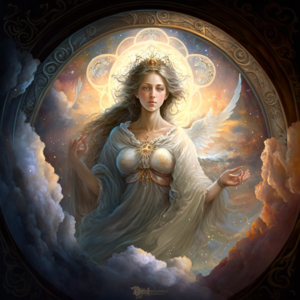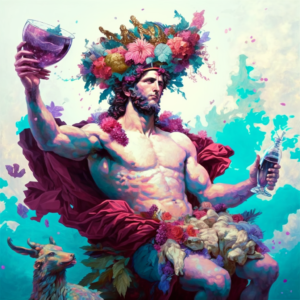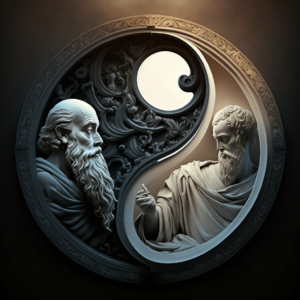3/23
If you like this article and want to read this book, you can buy it here: Valis.
Is it really a review when a book is literally two months younger than you are? Not really. So let’s not call this a review, instead let’s have a look at the story and some of the most important quotes I found on a re-read of Valis.
 I saw something pretty funny watching a YT video review of Valis and the reviewer was spitting fire because he was furious that towards the end of the book (I’m going to give you a spoiler warning while aware this book is as ancient as I am) the main character, Horselover Fat, is revealed to be Philip K. Dick. Now, really this is no surprise and it’s not done in a Chuck-Palahniuk-Fight-Club kind of way. Philip K. Dick is a character in the book as well and on page three he tells the reader that’s he’s also Horselover Fat and that he created this alter-ego/personality to try to make sense of the mental breakdown he underwent and the mystical experiences he had too. So, yea, the moral of this paragraph is if you’re going to make a YT video about a book, pay attention to the words in said book.
I saw something pretty funny watching a YT video review of Valis and the reviewer was spitting fire because he was furious that towards the end of the book (I’m going to give you a spoiler warning while aware this book is as ancient as I am) the main character, Horselover Fat, is revealed to be Philip K. Dick. Now, really this is no surprise and it’s not done in a Chuck-Palahniuk-Fight-Club kind of way. Philip K. Dick is a character in the book as well and on page three he tells the reader that’s he’s also Horselover Fat and that he created this alter-ego/personality to try to make sense of the mental breakdown he underwent and the mystical experiences he had too. So, yea, the moral of this paragraph is if you’re going to make a YT video about a book, pay attention to the words in said book.
Valis – Philip K. Dick
Valis is an incredibly good book, it’s profoundly deep and emotional and just jaw-droppingly awesome in the magnitude of the subject that it takes on; trying to make sense with meeting the divine. I watched a documentary a while back; The Gospel According to Philip K. Dick and Robert Anton Wilson is interviewed as part of it. He says something along the lines of that Dick had a mystical experience in the 1970s and spent the rest of his life trying to make sense of it. But he didn’t get dogmatic about it, he would just go with different possibilities of what it was and examine all of them and exhaust them and still couldn’t make sense of whether he’d experienced the divine or something calling itself the divine.
So what happens in Valis? Horselover Fat has a experiences with a Cosmic entity he calls Zebra that beams a pink laser of light into him which he deems to be theophany, an experience with the divine. This Zebra orbits above earth somewhere and its goal is to help humanity. It incarnates periodically as a human on earth, as Jesus, the Buddha etc. and also helps outset Richard Nixon from the White House, albeit, he’s named Ferris F. Fremount.
One of Horselover Fat’s friends, Kevin turns him and Dick onto a film called Valis which is made by a rockstar and his lady friend. The film is about how V.A.L.I.S (Vast Active Living Intelligence System) also an orbiting craft, brings down Nixon, beams lasers into people transferring information and posits towards time dysfunction. All things that Horselover Fat/Dick have experienced thus far.
They seek out the film makers using a cipher from the film and are invited to the home of the filmmakers where they meet a young girl who is the latest incarnation of V.A.L.I.S on earth, sent here to help humanity.
The Mind of Philip K. Dick
There’s a couple of ways you can look at this book, it’s all gobbledygook and Dick had feasted on too many disco biscuits and had gone cuckoo bananas. Or you can look at the story and see it as a person who had schizophrenic break thanks to a mental/mystical experience and they’re tying to make heads or tails from it.
 For me though, we’re getting a look into Dick’s mind here and that’s really what we have to come away with from this book with. He’s making sense of his issues regarding his failed suicide attempts, his savior complex (all though his life, Dick would befriend charity cases, two are mentioned in the book) and his mystical experiences. He examines Gnosticism and Sophia, the Kabbalah, Manichaeism, Christian and Jewish religious philosophy, Eastern traditions, Greek philosophy and the Divine Twins of the Proto-Indo Europeans in his quest to piece together and make sense of what happened to him. But, as Wilson was paraphrased above, ultimately not sticking dogmatically to any of them and letting all these things be a possible factor in what happened to him.
For me though, we’re getting a look into Dick’s mind here and that’s really what we have to come away with from this book with. He’s making sense of his issues regarding his failed suicide attempts, his savior complex (all though his life, Dick would befriend charity cases, two are mentioned in the book) and his mystical experiences. He examines Gnosticism and Sophia, the Kabbalah, Manichaeism, Christian and Jewish religious philosophy, Eastern traditions, Greek philosophy and the Divine Twins of the Proto-Indo Europeans in his quest to piece together and make sense of what happened to him. But, as Wilson was paraphrased above, ultimately not sticking dogmatically to any of them and letting all these things be a possible factor in what happened to him.
There are many examination of mental health aspects here, long before most authors would ever attempt to write about such things. In trying to figure out what mental illness is, Dick’s character says:
Perhaps this is the bottom line to mental illness: incomprehensible events occur; your life becomes a bin for hoax-like fluctuations of what used to be reality. And not only that—as if that weren’t enough—but you, like Fat, ponder forever over these fluctuations in an effort to order them into a coherency, when in fact the only sense they make is the sense you impose on them, out of the necessity to restore everything into shapes and processes you can recognize. The first thing to depart in mental illness is the familiar.
Horselover is hospitalized for a period in the book and it’s in the hospital where he can really examine his thoughts that he finds some answers, which he thinks Zebra/V.A.L.I.S has sent to him. Dick writes about a book Horselover is writing about his experiences, we know now that this was Dick’s own Exegesis which he was constantly writing as a way to make sense of what happened to him on 2-3-74. It would seem from reading a few of Dick’s books now that one idea he does like to play with quite a bit is the idea that the universe is irrational and chaotic. Here he writes about this belief and that if the universe is irrational then we must be too:
In Horselover Fat’s exegesis the theme of this issue is put forth over and over again. Fat believed that a streak of the irrational permeated the entire universe, all the way up to God or the Ultimate Mind, which lay behind it. He wrote: 38. From loss and grief the Mind has become deranged. Therefore we, as parts of the universe, the Brain, are partly deranged.
An Irrational Universe
Later he adds more to this argument that reality/the universe/God is irrational:
Entry no. 30 from his exegesis: The phenomenal world does not exist; it is a hypostasis of the information processed by the Mind. 35. The Mind is not talking to us but by means of us. Its narrative passes through us and its sorrow infuses us irrationally. As Plato discerned, there is a streak of the irrational in the World Soul. In other words, the universe itself—and the Mind behind it—is insane. Therefore someone in touch with reality is, by definition, in touch with the insane: infused by the irrational.
To get out of hospital he must appear sane to Dr. Stone but there’s a streak of the irrational in Stone who likes to debate with Fat about philosophy and metaphysics. He basically tells Dr. Stone that all humans are insane. Here follows one such conversation with Dr. Stone.
One Mind there is; but under it two principles contend. The Mind lets in the light, then the dark; in interaction; so time is generated. At the end Mind awards victory to the light; time ceases and the Mind is complete. “But,” Dr. Stone said, “if Mind awards victory to the light, and the dark disappears, then reality will disappear, since reality is a compound of Yang and Yin equally.” “Yang is Form I of Parmenides,” Fat said. “Yin is Form II. Parmenides argued that Form II does not in fact exist. Only Form I exists. Parmenides believed in a monistic world. People imagine that both forms exist, but they are wrong. Aristotle relates that Parmenides equates Form I with ‘that which is’ and Form II with ‘that which is not.’ Thus people are deluded.”
But he had the sense to know that this maze of confusion is endless. He wrote:
There is no route out of the maze. The maze shifts as you move through it, because it is alive.
There are about a hundred other things I could say about this book but I’ve taken enough of your time as it is. So, let’s end then with one final quote Horselover Fat/Philip k. Dick has come to make peace with the irrationality of God/the universe/Valis. Why? Because there is something of the divine madness in us. It is inescapable and to even try to escape it brings you to madness. So there is no point to even try to escape it, or name it or analyze it really. It’s just how it is. The universe is illogical. Amen to that.
When you know this you have penetrated to the innermost core of religion. And the worst part is that god can thrust himself outward and into the congregation until he becomes them. You worship a god and then he pays you back by taking you over. This is called “enthousiasmos” in Greek, literally “to be possessed by the god.” Of all the Greek gods the one most likely to do this was Dionysos. And, unfortunately, Dionysos was insane. Put another way—stated backward—if your god takes you over, it is likely that no matter what name he goes by he is actually a form of the mad god Dionysos. He was also the god of intoxication, which may mean, literally, to take in toxins; that is to say, to take a poison. The danger is there. If you sense this, you try to run. But if you run he has you anyhow, for the demigod Pan was the basis of panic which is the uncontrollable urge to flee, and Pan is a subform of Dionysos. So in trying to flee from Dionysos you are taken over anyhow.
If you like this article and want to read this book, you can buy it here: Valis.

5 thoughts on “Book: Valis – Philip K. Dick”